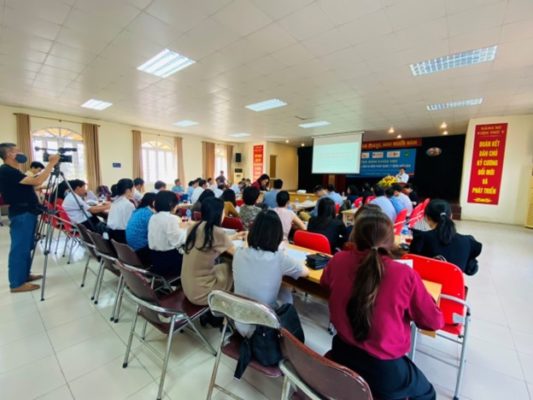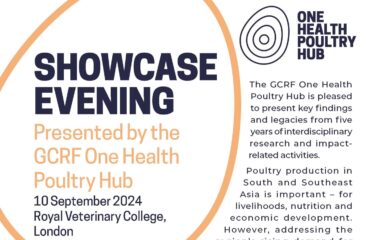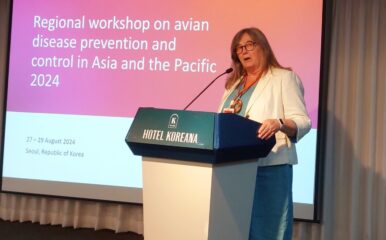
Vietnam team holds event to share disease management knowledge and early findings
Published on 23/11/2022

View this page in:
VietnameseThe Hub team in Vietnam held a successful seminar to discuss poultry diseases and their effective control as well as to share early findings from their research.
Participants included veterinarians of animal husbandry and veterinary departments and agricultural service centres in five northern provinces of Vietnam, representatives of feed-farm-food (3F) companies, poultry farmers, and researchers from the Food and Agriculture Organization (FAO), the International Livestock Research Institute (ILRI) in Vietnam and the Institution of Environment Health and Sustainable Development who have conducted research on One Health and poultry diseases.
Professor Vu Dinh Ton, National Coordinator of the One Health Poultry Hub in Vietnam, gave an opening speech on the poultry disease situation and the importance of applying appropriate control measures at poultry farms to mitigate disease outbreaks and antimicrobial resistance (AMR). Dr Daan Vink, Hub programme manager, expressed his pleasure at participating in the seminar and meeting with Vietnamese partners.
Professor Pham Ngoc Thach from the Vietnam National University of Agriculture presented on three groups of chicken diseases caused by viruses, bacteria and parasites, and he shared his experience on diagnosis and effective control measures for these diseases.
Avian influenza
Professor Pham said to achieve high efficiency in poultry production, good poultry breeds, good feed quality and good disease management are all needed, and further these need to be integrated within principles of good biosecurity and animal husbandry practices.
A particular challenge is presented by avian influenza, which not only causes high bird losses but also is often not recognised by poultry farmers. Farmers may then use inappropriate drugs to treat their sick birds, and only after they try several treatments without success do they seek assistance from veterinary experts. As a result, Professor Pham said, farmers suffer significant losses not only from high mortality in their flocks but also from the high costs of drug use.
He added that incorrect conceptions and a limited understanding of pathogens and disease mechanisms among poultry farmers leads to ineffective disease management, inappropriate drug use and can promote drug resistance. Farmers often use antibiotics for all flocks to prevent respiratory and intestinal diseases when the weather changes or when there are just a few sick birds in the flock.
Disease surveillance
Dr Pawin Padungtod from FAO Vietnam presented on the current avian influenza situation and some results of avian influenza surveillance in Vietnam.
He said that avian influenza surveillance in Vietnam is implemented via outbreak investigations and live bird market surveillance in high-risk provinces, but it is difficult to eradicate avian influenza as globally there are multiple subtypes and clades of the virus. The main strains detected in Vietnam have been H5N1, H5N6 and H5N8 viruses.
Finally, Hub co-investigator Ms Nguyen Huyen Trang presented on the research conducted by the National Institute of Veterinary Research to investigate patterns of avian influenza virus and foodborne pathogens (Salmonella, Campylobacter and E. coli).
She explained the Hub’s research methodology and shared early findings, including that prevalence of the avian influenza virus (M gene) was highest in slaughter facilities (35%), followed by markets (28%), and was lowest on farms (8%).
Low pathogenic avian influenza H9N2 was detected in slaughter points, markets, industrial slaughterhouses, and farms in 29%, 12%, 8%, and 4% of samples respectively, while high pathogenic avian influenza H5N1 was detected in just one chicken sampled at a slaughter point.
The speakers were followed by a general discussion with participants in the room.
Veterinarians from the provinces represented and 3F companies shared their difficulties in controlling avian influenza and respiratory diseases and expressed their interest in the seminar content, as information on avian influenza strains and vaccination strategies for poultry farms is helpful for poultry disease mitigation. Poultry diseases can cause heavy economic losses and some can also transmit to people.


